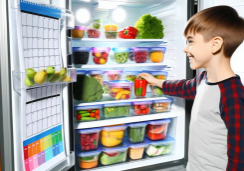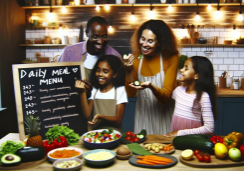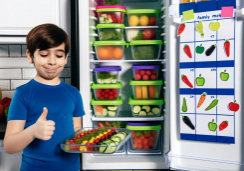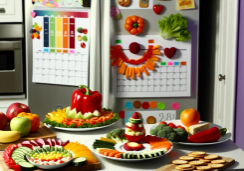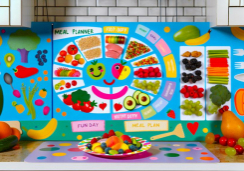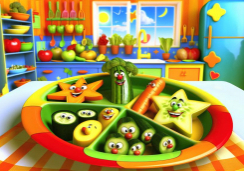3 Key Tips for a Gluten-Free Weekly Menu
Imagine standing before a pantry full of possibilities, yet the challenge you face isn't just about choosing what to cook, but ensuring it nourishes your body in a way that aligns with your gluten-free lifestyle.
You've made the commitment to live gluten-free, and while the journey is rewarding, it certainly comes with its fair share of hurdles. To streamline your weekly meal planning, you'll need to embrace strategies that not only cater to your dietary needs but also simplify your life.
The first tip lies in the art of preparation; by planning your meals in advance, you're less likely to find yourself in a pinch, resorting to options that might compromise your gluten-free regimen. Remember to keep your pantry stocked with a variety of gluten-free staples, and don't shy away from experimenting with new recipes that could rejuvenate your menu.
As you ponder the endless combinations, consider how a rotation of diverse ingredients could prevent your taste buds from growing weary and your meals from becoming monotonous.
Stick with me, and soon you'll uncover the nuances of balancing nutrition, variety, and convenience in your gluten-free weekly menu planning.
Plan Balanced Meals
To maintain a well-rounded gluten-free diet, you should kick off your day with a balanced breakfast that includes a variety of nutrients. A gluten-free meal plan is crucial, especially if you're managing gluten sensitivity. It's not just about avoiding gluten; it's about ensuring you get all the nutrients you need. This means your meals should be rich in fruits, vegetables, lean proteins, and gluten-free whole grains that can provide essential fiber and vitamin B.
Prepping your meals in advance is a smart way to stick to a balanced meal plan. When you've got healthy gluten-free options at the ready, you're less likely to give in to less nutritious choices. Stocking up on gluten-free pantry staples paves the way for effective meal planning. With the right ingredients on hand, you can whip up gluten-free meals that are both satisfying and nutrient-packed.
Don't hesitate to seek advice from a healthcare provider or a dietitian. They can offer personalized tips to ensure your Gluten-Free Diet is meeting all your dietary needs.
Batch Cooking Strategies
Building on the foundation of a balanced gluten-free meal plan, batch cooking strategies can significantly streamline your weekly meal preparation, ensuring you have nutritious and varied options readily available. If you're managing celiac disease or a gluten sensitivity, you know avoiding foods that contain gluten is essential. By batch cooking, you'll have a clear plan ahead, which minimizes the risk of accidental exposure.
When you dedicate time to meal prep, consider these batch cooking strategies to maintain a gluten-free diet with ease:
- Set Aside Time: Reserve a block of time each week to focus solely on prepping meals for the week, using reliable cooking methods.
- Label Clearly: Use labels on your containers with dates to keep your fridge and freezer organized.
- Flavorful Variety: Play with different herbs, spices, and healthy fats like olive oil to keep your meals exciting.
- Resourceful Recipes: Tap into the gluten-free community for tried-and-true meal plans.
- Embrace Freezing: Double up on recipes and freeze portions to save time on busier days.
What Are the Key Tips for Creating a Gluten-Free Weekly Menu?
Crafting a gluten-free weekly menu requires thoughtful planning. Prioritize whole foods like fruits, vegetables, and lean proteins. Experiment with gluten-free grains such as quinoa and rice. Read labels meticulously to avoid hidden gluten, and batch-cook to save time. Most importantly, variety keeps a glutenfree weekly menu exciting and nutritionally balanced.
Diverse Ingredient Rotation
Ensuring your meals remain enticing and nutritionally complete, rotating a wide range of gluten-free ingredients is key to a successful weekly menu. If you're managing celiac disease or must avoid gluten due to other health concerns, you're already steering clear of the protein found in wheat. But beyond avoidance, your focus should be on embracing variety.
In your meal plan, incorporate different proteins—from plant-based options like lentils and chickpeas to lean meats and fish. These provide essential amino acids and vary your intake, so you're less likely to encounter nutrient deficiencies. Don't forget about healthy fats, such as avocados and nuts, which are vital for overall health.
When planning meals in advance, reach out to diverse gluten-free grains like quinoa, rice, and millet. These not only offer carbohydrates for energy but also contribute important vitamins and minerals. Colorful fruits and vegetables should feature prominently, ensuring you're getting a spectrum of nutrients to support your body's needs.
Consulting a registered dietitian can help to ensure your diverse ingredient rotation aligns with your nutritional requirements. They can provide tailored advice to keep your gluten-free diet both exciting and health-promoting.
Frequently Asked Questions
What Are the Key Features of Gluten-Free Food?
Gluten-free food avoids wheat, barley, and rye, preventing symptoms if you're sensitive. You'll focus on whole foods, read labels, manage cross contamination, plan meals, and choose substitutes when eating out or cooking.
How Do You Accommodate a Gluten-Free Diet?
You'll accommodate a gluten-free diet by choosing gluten alternatives, reading labels to avoid cross-contamination, and incorporating gluten-free grains. Dietary supplements and ingredient swaps help, as does joining support groups and careful meal planning when eating out.
What Is the Best Food for Gluten-Free Guests?
You'll want to offer grain alternatives and seasonal produce, ensuring dishes are from celiac-friendly restaurants with strict cross-contamination avoidance and clear gluten-free labeling. Vegan options and gluten-free snacks increase variety for your guests.
What Are the Best Things to Eat on a Gluten-Free Diet?
You should eat gluten-free grains, fresh vegetables, lean proteins, and whole fruits. Try dairy alternatives, nut flours, seed snacks, plant milks, rice noodles, and quinoa salads for a balanced, nutrient-rich diet.
Conclusion
You've got this! By planning your meals, you're on track to maintain a balanced, gluten-free diet.
Embrace batch cooking—it's a game-changer for saving time and ensuring you've always got a nutritious meal ready.
Don't forget to mix things up with a variety of gluten-free grains to keep your meals exciting and nutrient-rich.
With these strategies in place, you're well-equipped to thrive with your gluten-free lifestyle.
Remember, you're not alone—lean on your community for that extra sprinkle of inspiration.


